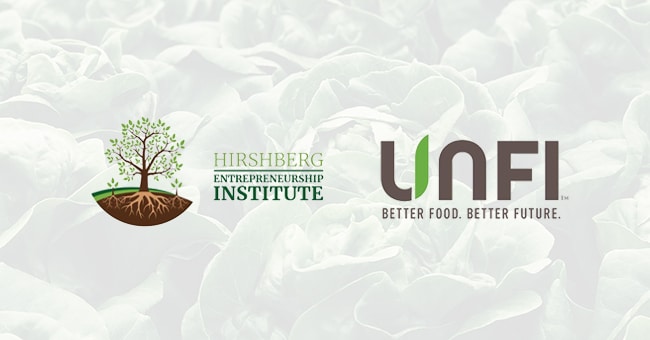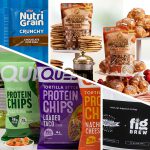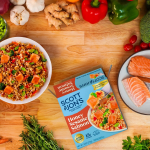UNFI EVP: Supply Chain, Communication Critical For Brands During COVID

Last month, as the COVID-19 pandemic hit the United States and consumers began stockpiling for prolonged isolation, many in the food and beverage industry believed that the rush on supermarkets would be short lived as consumers filled their pantries upfront before returning to more steady buying habits. But one month later, demand remains high, with no foreseeable timeline for a return to old norms, if ever.
Yesterday, John Raiche, EVP of supplier services at natural foods distributor UNFI, discussed in detail how the industry is adapting to the changes brought on by the novel coronavirus in a webinar hosted by the Hirshberg Enterprise Institute. Raiche offered advice for how brands can adapt to the new environment, how to best work with their retail and distribution partners to minimize disruptions, while also providing an update on how UNFI itself is responding to the demands of the crisis.
What Actions Brands Can Take
With retailers and distributors under constant pressure to meet consumer demand, Raiche recommended companies re-evaluate their supply chain and their product offerings to ensure they can keep production steady and shelves stocked. Beyond simply securing ingredients and packaging, brands should not be afraid to reduce their SKU counts down to only top-selling and strategic products.
“If you need to skinny down your product mix, that’s a reasonable thing to do,” Raiche said, noting UNFI is currently working with one brand that is reducing its SKU count from 100 items to four. “Resize your offering to align with what you can best support.”
He noted that UNFI is also ready to work directly with brands to help them make decisions on which products to cut, and will also help relaunch products once the economy rebounds.
“From UNFI’s perspective, from the retailers that we’re talking to, the retailers will appreciate and respect you for making hard decisions that basically benefit both yourself and the retailer the same,” he said. “We will have a willingness to help to get those products re-established when the time is right.”
In working with UNFI and other distributors, he said, brands must also be entirely transparent and be in constant communication — they should not shy away from sharing bad news. In some UNFI distribution centers this week, up to 50% of receiving appointments for brands were “no shows,” without product ready to ship. Raiche advised UNFI’s partners to alert the company as quickly as possible if shipments can’t be fulfilled and the company has set up a staffed 24/7 hotline that can respond to disruptions and cancellations immediately.
Companies should also be prepared for potentially permanent changes in consumer shopping habits. Prior to the outbreak, over 50% of dollar spend on food was spent outside the home, Raiche said, but being forced to cook most meals at home may “reset” people’s relationship with food and drink and the restaurant business is unlikely to return to where it was pre-COVID. Today, categories that were previously stagnating — such as canned soup, ramen and cereal — have seen huge upticks as consumers seek out pantry staples, while some emerging categories, such as milk alternatives, are also reporting surges.
However, shuttered on-premise meal prep stations in grocery stores, such as salad bars and delis, are unlikely to bounce back even once they are reopened, he said.
Pricing Pitfalls During COVID
As brands face a financial crunch, it may seem rational or necessary to increase prices in order to maintain cash flow. However, Raiche warned against sudden increases as price gouging laws vary state by state, with the “most draconian” of those outlawing any price increases during a state or national emergency. Even states that allow some freedom to up prices are cracking down on gougers and will investigate and punish sudden spikes unless brands can prove it is “absolutely necessary.”
Retailers as well prefer brands to not adjust pricing during the crisis, as there “is no appetite for unnecessary work” and it puts further strain on managers, planners and floor staff that are already working prolonged hours.
“If you can put off price changes, put it off,” he said.
On promotions, Raiche recommended brands evaluate whether or not to continue with planned promos on a case-by-case basis. Many retailers, he said, are still demanding promotions even during the crisis. As well, promotions that are already in flight cannot be pulled. However, if promotions are not yet in motion, UNFI will help brands to work with retailers to readjust planning and cancel the promo.
How UNFI Is Changing During the Crisis
UNFI currently has over 20,000 employees, with the majority positioned in the company’s 60 distribution centers, and has recently increased its head count by hiring warehouse workers who were laid off from the food service distributors that are struggling with the closure of offices and restaurant accounts. As well, he added, there is no shortage in the number of trucks available to make deliveries as almost all nonessential commerce has shut down and drivers are broadly available.
Capacity on trucks and in distribution centers has been increased “every way we know how,” Raiche said. Retailer orders in March, he noted, were at first higher than UNFI could handle with some orders requesting 400% of daily selection capacity for certain products.
The distributor is also working to ensure all vendors are paid, though there have been delays as the company’s accountants receive an unprecedented amount of invoices while working from home.
“We’ve never had more invoices to pay in our history than today,” he said.

















